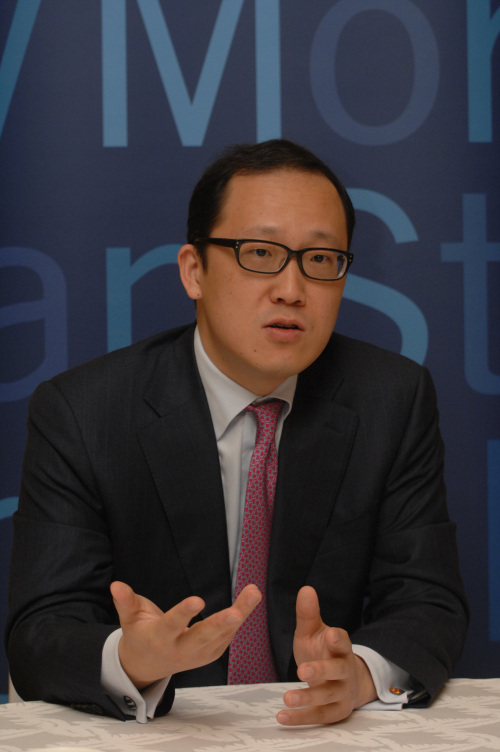Asia’s 4th largest economy unlikely to graduate to developed markets index soon
South Korea would be better off remaining in Morgan Stanley Capital International’s emerging markets index than entering its developed markets index, said a global investment bank.
Shawn Kim, an equity strategist and executive director at Morgan Stanley, said that Korea could end up like Israel and be ignored by global investors if it moved into the developed index.
“After Israel was included in the MSCI developed index, only the top five blue chips in Israel got attention from investors while the rest were ignored, although Israel had a lot more potential companies,” Kim said.

|
Morgan Stanley strategist Shawn Kim |
MSCI plans to review its annual classification in June.
If Korea were placed in the developed index, investors would only look at top blue chips such as Samsung Electronics, Hyundai Motor and POSCO, said Kim. The country would also see an outflow of capital as funds are likely be re-allocated to emerging markets where global investors would continue to invest amid the economic growth there, Kim added.
Korea does not have enough liquidity in the market to offset a possible outflow, he said.
So as stated in Morgan Stanley’s equity report, it is better for Korea to be the “big fish in a small pond than a small fish in the developed pond.”
Korea’s share among MSCI emerging markets is 15.23 percent in terms of market value, compared to 2.22 percent were the country to join the developed index, according to the report.
The other reason Korea is not ready to be categorized as developed is that Korea’s currency is not fully accessible around the clock in the global markets.
Unlike the global three currencies -- the U.S. dollar, the euro and the Japanese yen -- the Korean won is not convertible 24 hours a day or in offshore markets, the strategist explained.
“However, this is understandable as Korea is an export-driven economy, and it would be difficult in the short-term to see a policy change on its currency,” Kim said.
He added that there would need to be more of a consensus among investors to have Korea be part of the MSCI developed markets index.
Also, South Korea is no longer a market with geopolitical risks due to North Korea.
“We have not taken geopolitical risk into account for two years when analyzing the South Korean equity market,” he said.
Morgan Stanley has put Korean IT shares as overweight since “tech has gained tremendously in popularity recently, but still comes out cheap with strong earnings momentum.”
Meanwhile, energy shares are underweight as volatile oil prices are likely to add downward pressure on operating margins of energy companies.
The global investment bank forecast the benchmark KOSPI would end at around 2,200 points in 2012, trading within the band of 1,700 to 2,600.
Also, Helen Qiao, an economist in China, said a free trade agreement between Korea and China would help ease China’s trade imbalance with Korea, while boosting the Chinese economy to accelerate its industrialization and urbanization.
Korea’s export of materials, equipment and consumer goods to China will continue to gain momentum as China expands transportation infrastructure, while shifting its economy to be consumption-based to improve efficiency, she said.
By Park Hyong-ki and Park Min-young
(hkp@heraldcorp.com)
(claire@heraldcorp.com)







![[Today’s K-pop] Blackpink’s Jennie, Lisa invited to Coachella as solo acts](http://res.heraldm.com/phpwas/restmb_idxmake.php?idx=644&simg=/content/image/2024/11/21/20241121050099_0.jpg)